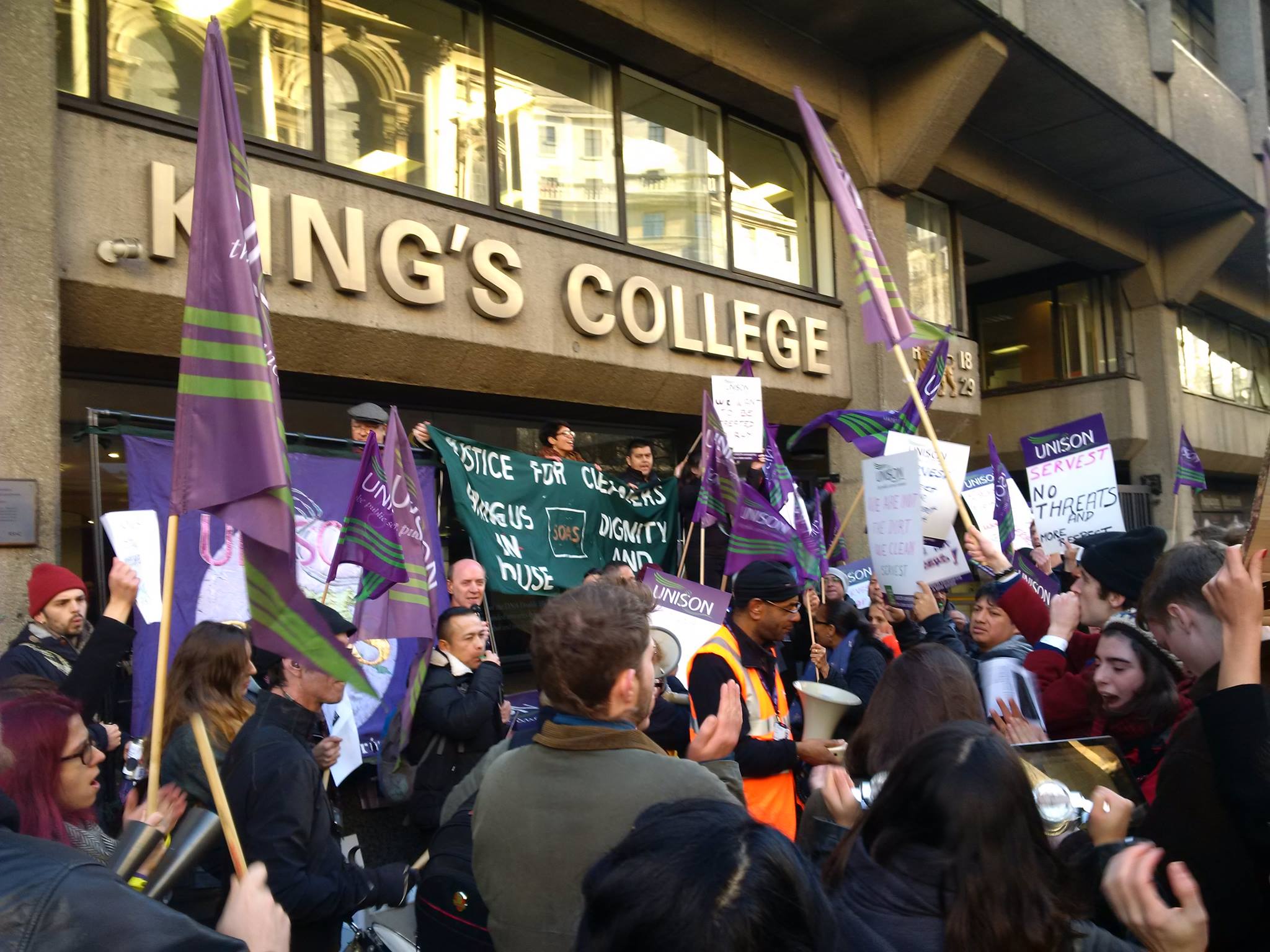On 27 September, the second day of term, the King’s College London (KCL) branch of UNISON carried out industrial action. To learn more about UNISON and the reasons underpinning their recurring strikes, Roar interviewed the KCL branch’s Black Members’ Officer and branch committee member, Zubaida Chowdhury.
What is UNISON?
UNISON is one of three recognised trade unions at KCL. Their KCL branch represents staff in the following areas at the university: Administration, Catering, Cleaning, Estates, Finance, HR, KCLSU, King’s Sport, Libraries, Professional Services, Residences, Student casual staff, Student Services and Security.
In Ms Chowdhury’s words, UNISON’s central purpose is “to create a really good environment for workers in an organization such as King’s,” and their main goal is “to have good conditions, good pay and have overall good satisfaction for members”.
Why did UNISON launch industrial action in September?
Ms Chowdhury, Programmes Officer in the College’s English department, stated that UNISON is currently in a dispute with KCL due to their failure to pay workers in line with inflation:
“We want pay that’s good and that’s in line with inflation, which is 14.3% plus 2%, and it keeps going up.”
She clarified, however, that “taking industrial action is a last resort”:
“We’ve had negotiations, we’ve come to the table, we’ve spoken- but we’ve been pushed by KCL to take strike action.”
How long has UNISON been tussling with KCL?
UNISON has launched industrial action at KCL for fair pay several times over the past decade.
Ms Chowdhury noted that feeling undervalued at work was especially a problem for UNISON members during the pandemic:
“As I’m sure you’re aware, cleaners and security staff were all on campus during the pandemic; during the storm. They kept the buildings open, safe, clean – they were sacrificing a lot while the rest of us were working from home.”
“We’re just asking that they’re – because they are usually the lowest paid – that they’re paid in line with the rest of the country and inflation.”
How do UNISON’s frustrations with KCL impact members in their day-to-day lives?
Ms Chowdhury made it clear that UNISON’s struggle with KCL impacts members beyond the picket line:
“It means really poor working conditions. Contracts are terrible. They’re precarious, as you’re aware of with the current GTA campaign. It means lots of stress. Work’s just manic.”
She attributes the high stress levels KCL staff are facing to an increase in student numbers this academic year that has failed to be met with an appropriate rise in staff numbers:
“That’s security, that’s all professional services staff, that’s academic staff. We’ve had so many students this year that, I’m sure you’ve heard, there was no accommodation for students. We’re just taking on loads of students but we can’t fulfil the demand.”
“Staff sometimes do two peoples’ jobs – sometimes even three peoples’ jobs – within the college, just to give you guys a good student experience.”
When it comes to being paid out of line with inflation, Ms Chowdhury noted many staff members have faced hardships such as taking on second jobs, using food banks, and suffering the physical, social, and mental ramifications of high-stress levels.
How did KCL respond to UNISON’s most recent industrial action?
Ms Chowdhury stated that UNISON has heard nothing from KCL in response to their most recent industrial action.
She added that the college keeps referring UNISON back to the university employer, UCEA, who they allegedly say makes decisions about pay. She questioned KCL’s inability to influence these decisions given its large size as an institution and the power that comes with that.
Ms Chowdhury also challenged KCL’s response given the 1 billion pounds it made during the pandemic, of which 81.5 million pounds was surplus:
“Why are we being backed into taking industrial action when there is money there, but we keep being told there isn’t money.”
She additionally referred to the increase over the past decade in the number of staff who are on annual salaries of 100,000 or more pounds, which rose from 185 in 2012 to 263 in 2017. In 2021, KCL’s annual Financial Statements stated this number was 259.5.
Given these figures, she stated, “I don’t buy the story and the lie that there’s no money.”
When Roar reached out to KCL for a statement on UNISON’s claims, Professor Adam Fagan, Vice President (Education & Student Success), King’s College London said:
“No member of staff takes the decision to withdraw their labour lightly and we fully respect the legal right of our staff to take industrial action. Not all staff are taking industrial action and the university will remain open, with continued access for students to the facilities and services on campus including informal study spaces, libraries and computer rooms.
“The issues raised on pensions, pay and conditions are felt across UK universities, and while it is important to understand that decisions on pay and pensions are decided nationally and not by King’s, we are supporting staff with the rise in cost of living within the context of national pay bargaining. This year’s national pay increase ranged from 3% to 9% with those on the lowest end of the pay scale receiving the higher percentage increase. In addition, most of our staff also received an incremental progression award which is equivalent to a 3% increase.
“We also increased the London Weighting Allowance by £500 to £4,000 in August and staff also received a one-off ex-gratia payment of £1000 (pro-rata) in July. The current London Living Wage is £11.05 an hour and King’s pays a minimum of £12.55 per hour. This is in addition to the increases in pay from national bargaining.
“Precarious employment is something we are taking action on and our default position is to employ staff on indefinite contracts. However, the nature of some roles does mean that we will always have a need to employ some staff on fixed-term contracts or on an hourly paid basis. This can be helpful to support parental leave, and roles covered by external research grants. Where we can anticipate a need for particular roles, we are employing staff on permanent contracts beyond the end date of the research project or teaching assignment.
“We do understand the intensity in workload and we are taking steps to tackle it for example, by offering additional resource – but we know that is not a long term solution. Fairness and equal opportunity are deeply important to who we are as a university, so we’ll continue to address issues of workload so that we can make improvements for all of our staff.”
What are UNISON’s goals moving forward?
Ms Chowdhury stated that UNISON’s goals remain the same:
“Our priority is that members have a good working environment and are being paid for the work that they are doing.”
She shared that to achieve these goals, UNISON will be joining the University and College Union (UCU) in their industrial action on 24 and 25 November.
How can students support UNISON’s industrial action?
Ms Chowdhury encouraged students to support UNISON’s future industrial action by spreading the word and talking to peer staff about why they are sacrificing their pay to go on strike.
She also invited students to join UNISON on the picket lines on 24 and 25 November:
“It’s something that we should be out together supporting and fighting for.”
She further noted that for students interested in going into academia, UNISON’s cause is particularly relevant given their battles with employers over pensions and pay at universities.
What else is UNISON working on right now?
Beyond future industrial action, UNISON is currently working with KCL on a disability passport scheme. This is something that already exists for students, while decisions on disability support for staff depend on managers. UNISON feels there should be a clear process from the day someone with a disability signs their contract with the college to get the adjustments they may need.
UNISON is also working on building their branch at KCL in terms of increasing their visibility and creating self-organising groups.
They are also continuing to have conversations with UCU, trade union Unite, and KCL at the senior level.
Finally, they are looking to launch an Unsocial Hours Allowance Campaign, aimed at granting staff such as security and cleaners who work early mornings, late nights and night shifts an allowance that matches their pay to other UK universities and councils.
In a final message to students, Ms Chowdhury stated, “Your experience is affected by how we are treated in that for a better student experience, there needs to be a better staff experience- we need to be paid better.”
She said while she will always “go above and beyond” for the students she works with, KCL makes this difficult:
“I think it’s in everyone’s best interest to have staff be paid better, have better conditions, and be happier at King’s.”



















